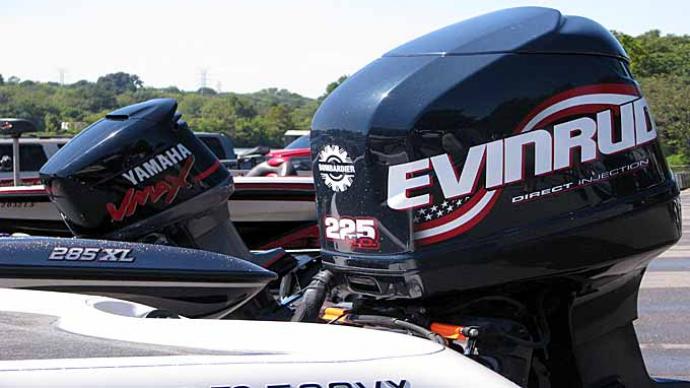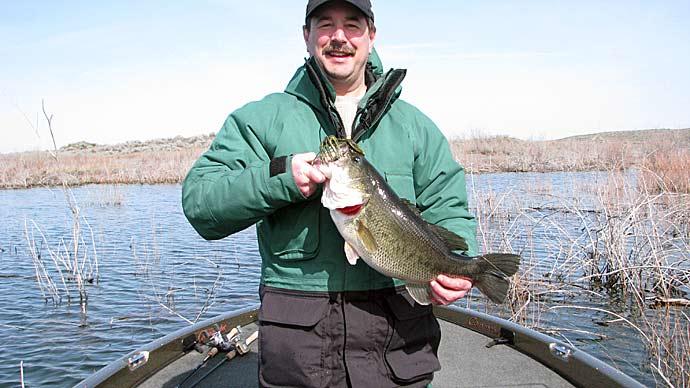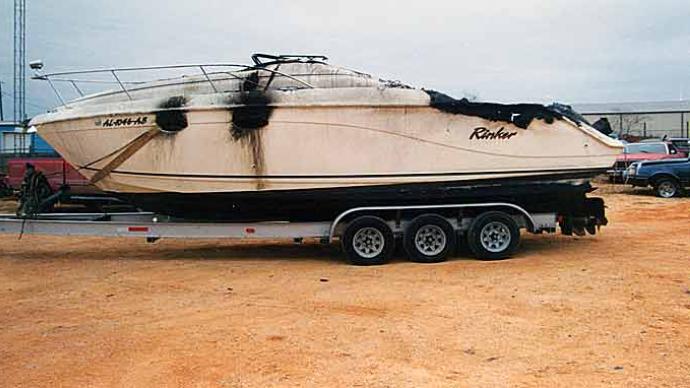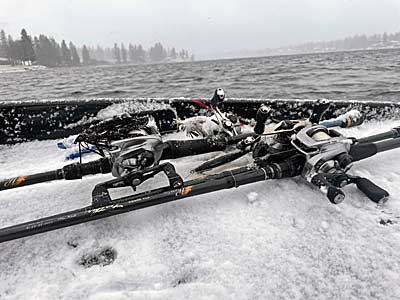
One of the saddest days of the year for bass anglers in northern climates is the day when you put the boat away for the season. Winterizing your boat is a dreaded yearly event necessary to protect it from the upcoming winter cold. But, unfortunately, it's a must if you want to protect your rig and ensure it's ready to go next spring.
The following tips will ensure you consider everything before storing the boat for its long winter nap. If you are planning to make a few late-season trips, the steps outlined below will help make sure you are doing everything possible to protect your rig from the elements.
Do-It-Yourself or Take it In?
To winterize your outboard, you can go in two different directions. Either take it to your local dealer or do it yourself. No option is wrong, and it generally comes down to your mechanical ability and how much time you have in your schedule.
There are many resources online with step-by-step directions for winterizing your boat, and you can do it in an afternoon with the right supplies. Taking it to a dealer will cost more, but it offers additional benefits. While performing the winterization, they can also do a full service of your engine and look over every aspect of your boat, motor, and trailer to ensure everything is in tip-top shape. But, of course, that's also something you can do yourself.
Speaking of other maintenance, the end of the year is one of the best times to look at everything else on your boat. That includes your trailer tires, lighting, brakes, and more. If something needs to be fixed, now is the time to take care of it, and you can beat the rush and have everything ready to go when the fishing season kicks off again in the spring.
Storage and Maintenance
Even after the outboard has been serviced and placed in its winter storage location, there is more work to do. One of the most critical things is the gas tank. Fill the tanks entirely and add a fuel stabilizer before storing the boat. This is the preferred method and will prevent the build-up of moisture and varnishes that could cause issues with your fuel lines.
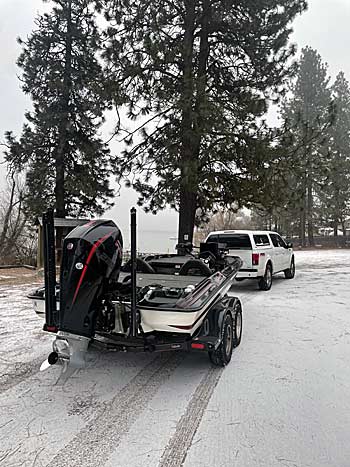
One often overlooked item when wrapping up the fishing season is your batteries. When stored, it's best to keep them charged regularly. This can be done with an onboard battery charger every few weeks or manually as needed. Also, it's an excellent time to add distilled water to lead-acid batteries to ensure they continue performing their best and last longer.
Props are another thing many need to consider; winter is the perfect time to ensure they perform correctly. Of course, removing your trolling motor and outboard prop should be done regularly throughout the fishing season to look for discarded fishing line, but doing so in the winter has other benefits.
Dinged outboard props will affect boat performance, and now is the perfect time to take them to a prop shop to be repaired. The same goes for trolling motor props, and it's easy to replace damaged props during the winter when just about everyone will have them in stock.
As your boat is stored, tackle storage is another thing to consider. It is the perfect time to remove every single box, rod, reel, and bag in your boat. It will allow you to take a good look at your inventory and see what needs to be replaced or repaired. The other benefit is that you can cull out things that are not needed when you start fishing again.
Depending on where you store your boat, you may need a cover. A standard boat cover will suffice for boats stored outside in many climates, but adding a tarp held down by straps and frozen gallon water jugs will add more protection and keep the tarp secured. Unfortunately, some boaters must keep their boat uncovered; this extra step helps greatly. After a snowfall, clear the cover as soon as possible to avoid damage to the cover or the boat itself as the snow melts and refreezes.
Pushing it to the Limit
If you are not quite ready to call it quits for the season and want to squeeze out a few extra late-season tips, there are still some things that you have to keep in mind to protect your boat from damage.
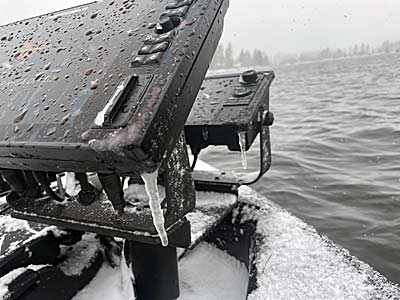
As the weather begins to dip below freezing, water is one of the biggest dangers to your boat. Freezing water can cause significant damage to your outboard as well as livewell and bilge plumbing. The simplest thing you can do is ensure all water is drained so nothing freezes. It's an obvious step but can prevent significant damage.
Removing water from your outboard is simple and can be done by lowering it all the way down, so it is in a vertical position while the boat is on the trailer. Any remaining water will self-drain and help to protect your lower unit from damage from freezing water.
Simply removing your drain and livewell plugs and letting everything drain for the rest of the boat is vital. Also, check for residual water in your livewell, cooler, and other compartments. Even a slight amount of water will freeze and become a much bigger problem.
The cold that comes each fall and winter signal the end of the season for many anglers, but it's also a perfect time to evaluate your entire rig. In downtime, there is never a better time to take care of the little things instead of waiting for spring when fishing is on your mind.


